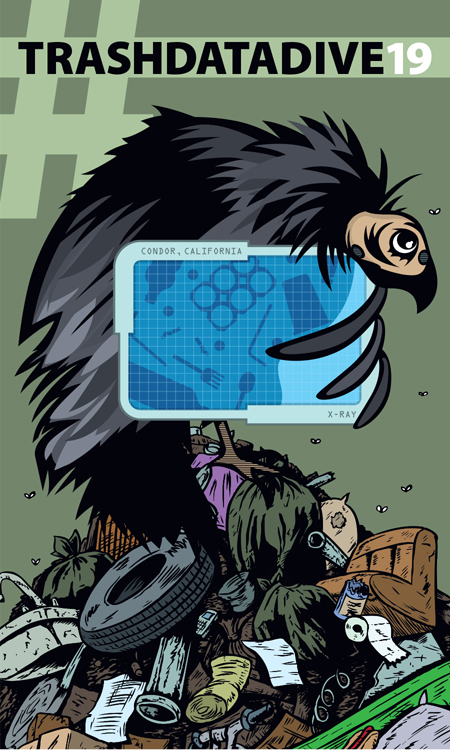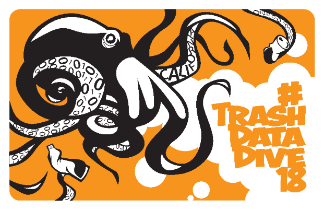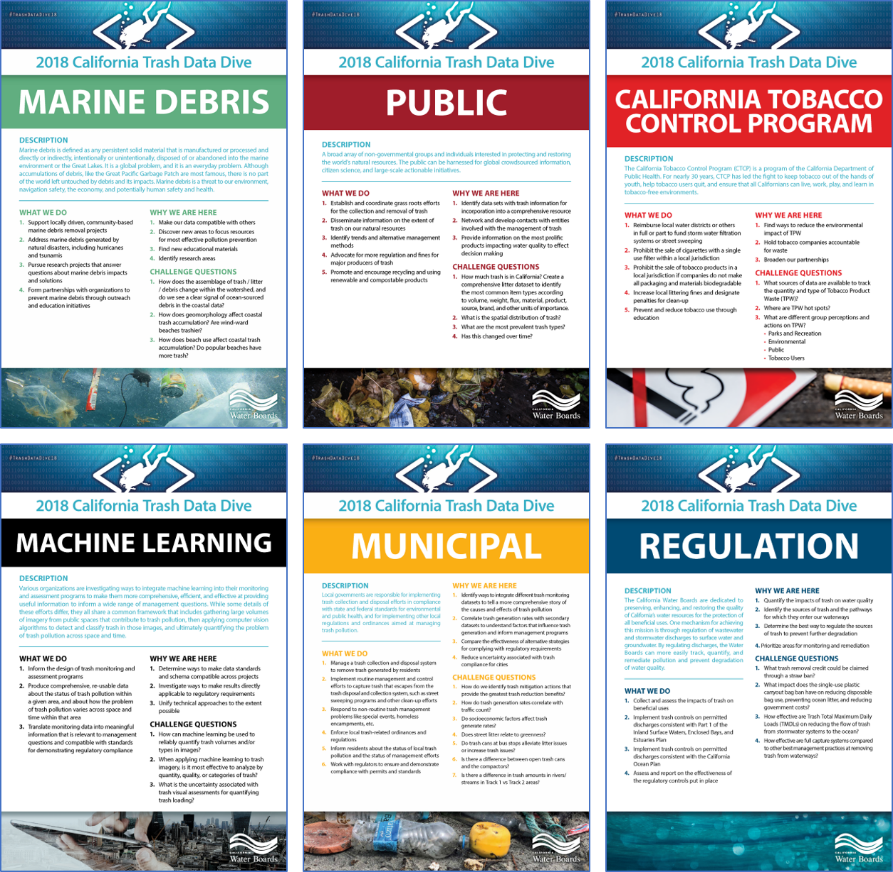
Annual Trash Data Dive
Who and What:
The State Water Resources Control Board’s Office of Information Management and Analysis will be hosting an annual immersive Trash Data Dive where data scientists work alongside trash experts, municipalities, policy writers and others to attempt to inform how and where trash is generated, transported, and deposited. The 2019 event will continue to build off the 2018 data dive summarized below.
Goals and Objectives:
The overarching goal of these annual data dives is to construct an understandable, credible statewide picture of our current trash management situation. Specifically, develop a trash management picture informed by open and accessible data, to identify and understand trends, data gaps, and priorities. This can best be accomplished through data visualizations and stories which can inform and direct statewide monitoring design, implementation, and reporting.
Our specific ongoing goals and objectives include:
- To gain better insight into the trash life cycle and how it is impacting our waters (e.g., Where is it coming from? How much is in our waterways? Are Best Management Practices (BMPs) working? Where are the hotspots? How much trash is making its way into the ocean?).
- To obtain a better understanding of data standards, schema, and collection methodologies necessary to use trash monitoring data effectively.
- To collaborate across multiple disciplines and sectors to better understand the issue as a whole.
More Information and Contacts:
Stay tuned for the 2020 Trash Data Drive!
California Trash Monitoring Methods Project
If you are interested in joining an inter-agency workgroup under the Monitoring Council focused on coordinating trash monitoring and reporting please subscribe to our email list at https://www.waterboards.ca.gov/resources/email_subscriptions/swrcb_subscribe.html. Select general interests and check the box labeled California Trash Monitoring Workgroup. You can also email mywaterquality@waterboards.ca.gov.
PAST DATA DIVES
2019 - 2nd Annual Trash Data Dive
November 15, 2019

2019 Trash Data Dive Summary
On November 15, 2019, the State Water Resources Control Board’s Office of Information Management and Analysis held the Second Annual Trash Data Dive at the San Francisco Estuary Institute, located in Richmond, California. The 2019 Trash Data Dive – a trash management questions workshop – was convened as an invite-only event where attendees built on the Inaugural California Trash Data Dive to compile, refine and prioritize management questions surrounding the nexus of trash and the following project areas:
- Data Models
- Homelessness
- Macro/micro Plastics
- Storytelling
- Tobacco
The main goals for the 2019 Trash Data Dive were to develop and prioritize said management questions and establish a rough plan for 2020 Trash focused Datathon or Hackathon style events. Datathons tend to involve more discussion about the question(s) at hand and the data available to answer them; questions may need to be refined and data found before participants can work on answering the questions with data. At Hackathons, participants use available data to build prototypes of analyses, visualizations, or interactive tools that answer refined questions.
If you were not able to make the 2019 Trash Data Dive but would like to give us your perspective, or participate in future California State Water Board Trash related events, please fill out our Trash Stakeholder Questions Survey!
The 2019 Trash Data Dive was attended by 37 trash subject matter experts from across California. Representatives from State and Regional Water Boards gathered together with those from other state agencies and municipalities (Agency), non-governmental organizations (NGO), private consultants (Private), and academic institutions (Academia). More detailed descriptions of the process, participants, and outcomes are available.
2018 - Inaugural Trash Data Dive
November 16, 2018

2018 Trash Data Dive Summary
On November 16, 2018, the State Water Board’s Office of Information Management and Analysis held the first ever 2018 Trash Data Dive (TDD). The TDD was convened at the San Francisco Estuary Institute, located in Richmond, California. It was well-attended by over 80 attendants and included participants from all over California to discuss the opportunities to address entrenched problems with respect to trash-related information. Representatives from Regional and State Water Boards gathered together with those from other state agencies, non-profits, municipalities, private consultants, and the interested public to develop new concepts and visualizations using available trash data as collated by the event organizers.
Ambassadors were selected prior to the TDD to represent knowledge about trash from a variety of different aspects. These included government agencies that serve both regulatory and regulated purposes, as well as research organizations and NGOs. Each ambassador was asked to give a 3 minute elevator pitch to describe what they do and what questions they were interested in having answered. In addition, ambassadors were polled before the TDD to develop a list of challenge questions for the participants to ponder going in to the event. The first set of TDD presentations, offered by the TDD Ambassadors representing their various sectors, is available below in the ‘Opening Presentations’ section.
Challenge questions were used to identify six areas of interest based on different sectors and included Marine Debris, Public, California Tobacco Control Program, Machine Learning, Municipal, and Regulation. Posters were created to describe each sector and identify the pertinent questions. Ambassadors were assigned a posters to stand next to and answer TDD participant questions in a “speed dating” round.

This gave the TDD participants the opportunity to interact with each other and determine which questions were most relevant to themselves and develop groups to identify the data necessary and the desired visualizations. Once groups were formed, they split out into different areas of the building to begin work on formulating ideas.
Participants detailed concepts spanning the gamut, from identifying plastics in multiple environments, to tobacco-pollution-focused problem-solving, to ideas for addressing trash among the homeless and overburdened communities, to a “power portal” designed to gather and distribute heterogeneous data types. The ideas generated and the opportunity for networking among like-minded individuals across many disciplines made this event valuable for the project team and participants. Among the many Contestant Presentations in the 2nd set of presentations below were a number of integrated and constructively imaginative data visualizations of some commonly occurring trash stories. More detailed descriptions of the process and project ideas and concepts are available.
Opening Presentations:
List of Ambassadors and Sectors they Represent:State Government
- Greg Gearheart’s Opening Remarks & Presentation (State Water Resources Control Board)
- Walter Yu (Caltrans)
- April Roeseler (California Department of Public Health)
Local Government
- MS4
- Gary Conley (2ND Nature)
- Lisa Moretti (City of Sacramento) (a Local Municipality)
Regional Government
- Shelly Walther (Sanitation Districts of Los Angeles County)
Research Organizations
- Tony Hale (San Francisco Estuary Institute)
- Shelly Moore (Southern California Coastal Water Research Project)
NGOs
- Holly Wyer (Ocean Protection Council)
- Carolynn Box (5Gyres)
- Jeff Kirschner (Litterati)
Federal Government
- Sherry Lippiatt (NOAA Marine Debris Program)
- Greg Gearheart’s Summary & Group Descriptions
Contestant Presentations and Awards:
Marine Debris: Shelly Walther & Sherry Lippiatt: Including the ‘Persistence of Plastics in Marine Environment off Southern CaliforniaCalifornia’s Tobacco Control Program – Tobacco Product Generated Trash
Public Outreach/Machine Learning & Litter Characterization: An Application using Google Earth
Regulation: Addressing Agricultural Trash
Municipal Trash Issues: Trash & Homelessness; Homelessness Costs; Urban Trash Risk; Urban Trash Data Visualization
Plastics & Big Data – the Power Portal Proposal; & Constructing a Trash Flow Chart
Data System Needs & Machine Learning: Data Aggregation & Curation
Public Issues & Outreach: Disproportionate Litter Issues in Overburdened Communities?
Next Steps & Group Discussion Led by Greg Gearheart
Winning Entry; The Power Portal Proposal by Andrew Hill
Further Discussion with Greg Gearheart
Monitoring Council Workgroups Follow up: Nick Martorano
More Detailed Description of Inaugural TDD Process & Project Ideas
CA TDD Background information
CA Trash Monitoring Methods Project


